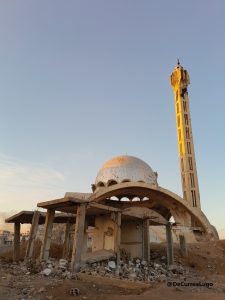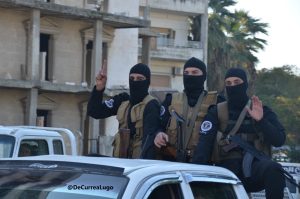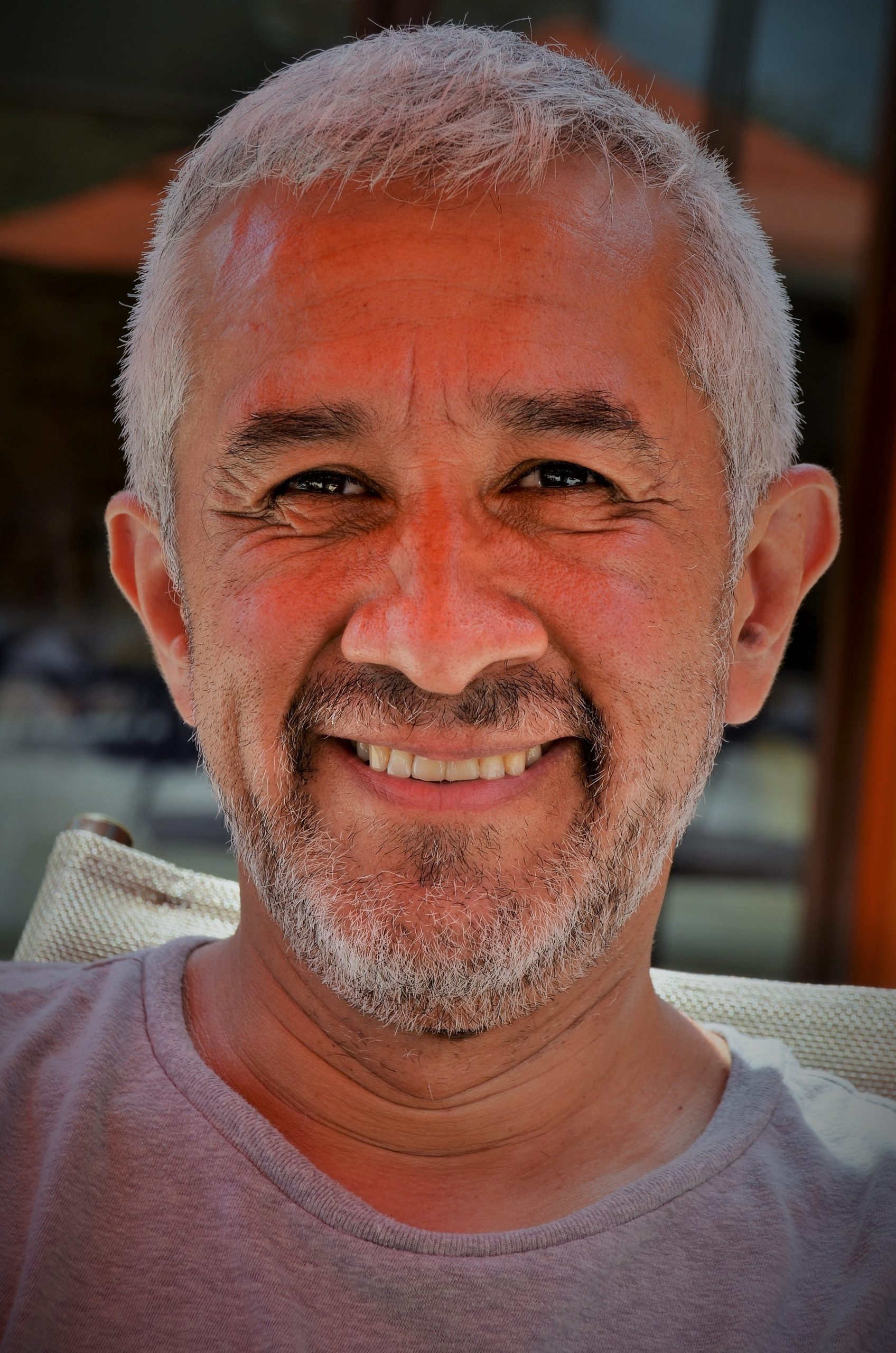by Victor de Currea-Lugo | January 30, 2025 (from Syria)
I remember that, in the early 1980s, arguing with communist militants, they tried to convince me that the Soviet Union’s occupation of Afghanistan was not an invasion but an act of «proletarian internationalism.» Years later, I learned the concept of the «umma» of the Muslim world and became aware of the duty of every believer to go to war, if necessary, to defend the Muslim community.
These two ideas, the defense of the umma and proletarian internationalism, are mechanisms and not necessarily justifications for anything. They are methods of struggle that must pass the test of political analysis—at least, that’s how I understood them.
Please, where I say «left,» read the left that still defends Bashar Al-Assad. I hope the others do not feel alluded to. This is not a rant against the left as a whole (the truth is that there are many lefts, in the plural) but an invitation to debate how we are seeing the situation in Syria.
Is Syria a forbidden topic?
Part of the problem of publishing one’s thoughts is that (some) left-wing readers cannot distinguish the texts of an analyst from those of an activist. This applies to Syria, Venezuela, Ukraine, and Colombia.
In the case of Syria, many people propose interpretations that straddle the concepts of the umma and proletarian internationalism. But they go even further than the defense of the common good; the defense of certain flags is accepted as valid. That something that justifies the sacrifice of the people is called “geopolitics.”
Others would call it “international chess,” a game in which the people (it could be Syrian or Palestinian) do not count per se, have no agenda, and are subordinated to the king and queen of the chess in question. And so, the people, turned into pawns, have no interests but are called to succumb to guarantee the advances of the geopolitical strategy.
To accept the above, we needed to convince ourselves of several premises. One of them is that what was being fought in Syria was another chapter of the war on terror. Curiously, the left adopts the same category with which many protests on power are disqualified worldwide. This category denies the context and reduces the conflicts to tensions between society and misfits called “terrorists.”
Bashar Al-Assad has made it known that all his opponents were terrorists and that the only way out to save the country was to “destroy the country.” In the case of the left, such a reading needs to affirm that the Syrian government was a just and anti-imperialist government, which was attacked by the friends of the empire and had no internal contradictions of classes or other concerns. It is necessary to deny that the government fell into authoritarianism and neoliberal policies.
This requires rewriting what Bashar and his father did for 54 years in Syria. Of course, this requires a significant mechanism of denial and the establishment of “narratives” (such a horrible word) and a great emphasis on conspiracy theory, without which it would not be possible to save the Syrian government. It is worth emphasizing that we are facing a left that is so postmodern that its dispute is over the narrative and not over reality.
The truth is that the Syrian government can and should be subject to scrutiny, like any other government, at least from serious journalism and political science. This does not in any way imply denying the progress in the welfare state that Hafez Al-Assad may have achieved, nor that, indeed, Syria belonged to the group of countries that did not accept the United States. But are those two things enough for the left?
It is worth asking, playing the game of “geopolitics” as the only value, why did the Russians not intervene in December 2024? Saying that they were busy with the war in Ukraine is not a sufficient argument. Some Russian sources insisted that Al-Assad should listen to his people. Iran and Hezbollah did not act either.
And Iranian sources say that even the already martyred general Qasem Soleimani insisted several times to Al-Assad that he listen to his people. I stayed, in that matter of internationalism, with the Vietnamese who did not hesitate to enter Cambodia and stop the genocide that Pol Pot was carrying out on his people in the name of communism. Could we stop looking at Cambodia because the principal contradiction is essential?
I am not going to dwell on something that I think we agree on: Israel is trying to win over the south, Turkey is trying to win over the north, and the United States is trying to position itself in the territory of the Kurds. The problem is believing that these are the only agendas that are crossed in the territory and that the Syrian people are minors, that they have no opinion, and that it should be “the adults” (read the external actors) who make the decisions. This infantilization of the people is part of the significant errors of the left.
Islam was seen by the Stalinist leftist

Let us assume, for the sake of debate, that the left knows something about Islam, that they do not say “Mohammedans,” that they do not believe that the Koran calls for violence, and that they are capable of understanding what the word Islam and its derivatives entail. I say “let us assume” so as not to prolong the debate, but I fear that there is more suspicion of Islam than what is known by many comrades.
Of course, when they feel joy, Muslims say, “Allah is great”; of course, they are not going to shout “proletarians of all countries, unite” because it is their concrete reality at a specific moment that they are celebrating.
One of the problems of the left is that when they see a Muslim with a rifle, they conclude that he is the same as another Muslim with a gun, and they are unable to distinguish (and much less accept) the tensions between, for example, Al-Qaeda and Daesh. That is as stupid as saying that Shining Path is the same as the Zapatista movement because they are “Latinos with rifles.”
Let us remember that the armed movement Tupac Amaru of Peru, in many of its communiqués, constantly distanced itself from Shining Path. Can we accept (as a fact, not as a wish) that Daesh and several Syrian groups fought each other with guns? There is a left that is guilty of generalizing and joining the idea of the empire that every Muslim (even unarmed) is a terrorist.
The role of religion in the Middle East is also being discussed, so much so that one of the flags used to defend Al-Assad is that he had “a secular government.” But being secular is no guarantee of respect for Human Rights, just as being religious does not imply greater or lesser political folly.
Liberation Theology has inspired armed organizations in Latin America, but that fact cannot lead us to conclude that we are facing a Crusade. In the same way, armed groups in the Middle East, with a Muslim majority, invoke their God (Allah) and their sacred book (the Koran) because it is part of their culture and society. What do we expect them to invoke? A text by Mao?
It would be foolish to ask them to put religion aside when facing a war, as silly as asking Hamas in Gaza to become secular amid a genocide and not resort to religion as an element of support.
Of course, those who have read from Marx only the little sentence “religion is the opium of the people” cannot read the following sentence where Marx recognizes that religion is also the spirit in a spiritless age. That is the spirit that allows Hamas, the other resistance groups, and the Palestinian people to endure; it is the same spirit that many religious fighters in Latin America had; it is the same example they drew on in the resistance during the Second World War.
Can we dismiss them because they are not secular? Culturalism, localism, inclusion, difference, and particularism are very important to the left, even when they come up against Muslims.
Syria’s solidarity with Palestine
Another argument often used to defend Al-Assad is that he is part of the “axis of resistance” and, therefore, part of the anti-Zionist bloc, which must be seen as a whole; we must take it or leave it without any reflection. So, the pertinent and indispensable question is: How anti-Zionist were Hafez and Bashar?
I am no longer talking about the massacre of Palestinians in Lebanon in 1974 or the destruction of the Palestinian camps in Yarmouk and Latakia but about the general policy of the Al-Assads. Everything indicates that they were subservient to Israel. As Netanyahu declared in 2018: “We have had no problem with the Assad regime. For 40 years, no bullet was fired in the Golan Heights.”
Allowing the passage of military supplies from Iran to Lebanon for Hezbollah is plausible, but it is not a sufficient argument. It would be worth listening to the Palestinians themselves who lived as refugees in Syria and who can attest that it was not a pro-Palestinian attitude that characterized the Al-Assad governments.
Without this element of discussion (how functional Al-Assad was to Zionism), it is impossible to make a serious reflection and debate. Everything indicates that this government was not a great defender of the Palestinian cause.
Part of opportunism and “selective solidarity” is saying that one can only be with Palestine if, for example, one is anti-imperialist. Then, they add that one must be secular. Then they told us that we had to be anti-patriarchal. And there are some (not all) who tell us that if we do not accept the Syrian government, we cannot be pro-Palestinian. For all of them, the Palestinian cause has so little specific weight that it serves as a bargaining chip in a lowly way.
The best way to resolve the debate about what is happening in Syria with the Palestinians is to talk to them, not to their neighbors in the region. In the same way the left should listen to the Kurds, whom they demonize as traitors and opportunists, ignoring the number of internal debates that the Kurds have (but that is another debate that the Stalinist left also refuses to give).
When I shared with some comrades what the Palestinians in Syria told me, they painfully jumped to ask what could justify those attacks by Al-Assad. The Yarmouk sector went from having half a million people to just 8,000. Many were displaced, others killed, missing, and in prison. Looking for justification (that maybe there were terrorists there) is the same as Netanyahu saying to destroy Gaza.
One of my interviewees was Mutasem Hamada, a member of the Political Bureau of the Democratic Front for the Liberation of Palestine (DFLP), who had been here for decades. His testimony would have some value, mainly because Marxism has influenced this organization and because it has been in Syria for many years.
Well, Hamada’s assessment was blunt: the Palestinians were subject to permanent observation by the Syrian secret police. Among other things, they were restricted from carrying out pro-Palestinian activities. Do we value his testimony, or do we say that he is so calmly giving interviews in Syria, proving he is from the enemy? In short, the Palestinian cause has a life of its own, and it would be an insult to put genocide as a piece in the geopolitical dynamics at the service of external actors.
On the Palestinian issue, the coincidence between the signing of the ceasefire between Hezbollah and Israel and the attack in Syria is often insisted upon. If HTS troops were at the service of Israel, it would have been much more beneficial to have attacked when Hezbollah was engaged in an open war with Israel and not wait for a truce since a truce would allow (if Hezbollah had so decided) to send troops to Syria.
Therefore, no military argument allows this temporal coincidence to be linked. Now, that Israel applauded the defeat of Bashar Al-Assad is actual, but, again, applauding the defeat of an actor does not mean approving the arrival of a new one. I was happy with the defeat of the United States in 2021 in Afghanistan, but I do not celebrate the return of the Taliban.
The week after the fall of Al-Assad, what Israel did was to attack many of the Syrian arsenals and military installations to prevent them from falling into the hands of HTS and occupying more territory, going beyond the line of the 1974 agreement. It is undeniable that Israel is not comfortable with a new Syria, mainly when they were already accommodated in the logic that it was better to have a known Bashar than an unknown HTS.
There were friends on the left who even suggested that the HTS offensive had been a consequence sought by Hamas when it attacked Israel to destabilize the Middle East and then hand Syria over to imperialism. This completely ignores the Palestinian struggle that began long before Bashar Al-Assad, completely ignores the local battle of the Syrians, and reduces the agendas of these peoples to recent years.
There is a mixed feeling among several people interviewed about Hizbollah: they support Hizbollah’s solidarity with the Palestinians, but they do not fully understand their support for Al-Assad or openly reject it. Trying to sell the Palestinian cause «as a whole,» which includes, equally, the Palestinian resistance in Gaza and the Al-Assad Government, is entirely deceitful.
Stalin is alive
Let us remember the nascent Russian Revolution’s inability to read its communities in the south of what would later become the Soviet Union; let us not forget the same mistake made when they tried to read Afghanistan from the binary logic of «bourgeoisie and proletariat» without understanding the culture. All this is understandable if we remember that in the Soviet Union, the so-called Young Marx and his manuscripts of 1844 were banned.
It is not in any way a question of making a cult here of culture as a central axis and more important than the economy; It is about, as your beloved Lenin would say, “the concrete analysis of the concrete situation,” and that situation goes beyond the bourgeoisie and the proletariat. But some, from dogma, dedicate themselves to making quotes out of context without understanding who the enemy of the masses is, who oppresses them, or who kills them.
It is paradoxical how harshly the struggles against power that are not essentially Marxist (the Kurds, the Syrians, and even Hamas) are judged. Still, a supposed hope is claimed in capitalist power blocks such as the BRICS. I understand that the world situation should lead us to look more at tactics than strategy and that we must conform to some social democratic measures and patches, but why do we demand that the people of the Middle East be pure and immaculate?
Another of the traps of the debate with the left is comparison. For example, since Iraq did not have weapons of mass destruction in 2003 (it did have them in the 1980s and used them against the Kurds in 1989, leaving 182 thousands of people dead), then, obviously, Syria does not have them. This premise is misleading, especially when the Syrian government itself accepted that it had them shortly after the start of the 2011 protests.
Another example of the comparison: since some of those who were up in arms against the Syrian government belonged to Daesh, then all the opponents belonged to Daesh. That is to deny the tensions, sometimes mediated by fighting, between different groups because they understood differently what should be built in Syria. Daesh, for example, was expelled from Aleppo by other groups.
The reality, not the narrative
Let us review the agenda left today a little. The left today is focused on fighting authoritarianism and neoliberalism (I leave aside the woke left that not only divides but also pushes back social struggles).
Let us honestly ask ourselves if authoritarianism and neoliberalism were part of Bashar Al-Assad’s policies. That implies a rigorous, serious, and objective debate. To say that the economic problem was due to the economic blockade is to ignore the social gaps that existed and continued under Al-Assad. The embargo cannot explain the gap between rich and poor. How can we defend a government that implements what we want to combat? What is our coherence? Is there room for criticism and self-criticism?
I have collected numerous testimonies in Jordan, Lebanon, Turkey, Iraq, and Syria of the use of barrels with explosives dropped from helicopters against densely populated areas. The only one that had the air capacity to do this was the Al-Assad government, not Al-Qaeda nor Daesh. Could it be that all these Syrians are lying? Are all these testimonies collected in different years and places, or is it a narrative paid for by the CIA?
If the war crimes that civilians testify to are credible when they are committed by the United States in Afghanistan, the paramilitaries of Colombia, or the army of Sudan, are they also credible when Syrian civilians denounce them? The demonstrations in Latin America are an example of struggle, but what do we say about the march of a million people in Hama in 2011 against the Syrian government?
Some defend the right of peoples to rebel and self-determination, but they believe they have the right to tell Syrians that they do not have the right to rebel because what is essential is “geopolitics.” It is difficult for me to tell the families I interviewed in northern Syria, in Selmah, who found their houses destroyed more than a decade after being displaced, that only “geopolitics” matters and that they do not even have the role of a pawn.

I understand the theory of the principal contradiction, but the sin is believing that this can become the “only contradiction” and denying the other potential inconsistencies. This central contradiction is expressed in people’s everyday lives, and it is in this everyday life that the masses can be invited to fight against the inconsistencies of the case but also put into context their local agendas, which count because, in the end, they are the ones that mobilize.
It was the local agenda that contributed to the creation of the Taliban in the 1990s in Afghanistan, in the midst of the chaos of the numerous armed groups; it was also the local agenda of the fishermen of northeastern Nigeria that favored the creation of Boko Haram; just as the regional agenda of the Sunnis of Iraq, after the US invasion, promoted the creation of Daesh. To say that these groups were magically «created» by imperialism ignores history.
No armed group (and the Latin American guerrilla knows this well) can survive without some support from the civilian population. And, for better or worse, the proto-state form that Syrian armed groups developed in Idlib for years bore fruit: the people supported them, and that is why they were able to topple Assad. This is a fact, not a moral qualification.
It is worth asking to what extent the Syrian government’s defense contributed to the fight against the central contradiction (for example, with Zionism or with capitalism) because it is debatable to what extent the government of Bashar and his father, for 54 years, really helped to build a better world.
Let us return to what we observed. I was in the famous Sednaya prison a few weeks after Al-Assad fell. The conditions of imprisonment show the undignified and inhuman treatment to which the detainees were subjected, including torture. Is this okay because they were enemies of the government? We have a left that has turned fighters into victims and that claims the voice of the victim as something sacred but rejects it if that victim expresses something contrary to the dogma of the left.
Let us remember that the left, within capitalism, accepts Human Rights as a paradigm; in fact, some civil rights are the only thing that the bourgeoisie has won. Do we throw them away to save the unsalvageable? Do we say that they are a European creation, and with that, we close the debate on torture? This prison shows a reality that any decent leftist should consider.
Some people disqualify my position because, according to them, I do not know enough Syrians, and they have spoken: “with real Syrians.” They also do not validate visits to the field because, for them, that is “not an argument,” nor is academic review because “all the books are written by the powerful.” But the voices of Syrians in Syria do not count either. I was able to speak with Alawites, soldiers of Al-Assad’s army, small-time traders, and even members of the police of the new government. Does that count? If theoretical study, direct observation, and primary sources are useless, how do you study reality?
The wolf is coming
Just as Palestine is not just Gaza and Gaza is not just Hamas, the Hayat Tahrir el-Sham (HTS) group is one of the 47 armed expressions of present-day Syria. However, it is one of the many others that have existed throughout this war since 2011. To think that HTS was, is, and will always be the same is to ignore a dynamic that draws my attention in the case of Syria: organizations are a means and not an end; they have a very high level of mutation, fragmentation, and regrouping.
I understand that those who use the Communist Party (in its different forms) as a reference see a formed actor that remains over time. I have observed that the groups in Syria can be counted by the hundreds, with a great dynamic of alliances, ruptures, rearrangements, and name changes.
What is the reason for this? I hypothesize that what is essential is not the name or the organization but what is being pursued. Therefore, whether it is called HTS or something else matters little; some refuse to continue being called HTS because they consider that this organization has already fulfilled its task and is dissolving into the government.
The disqualifying argument is that those who come to power in Syria “are the bad guys” and, therefore, “the lesser evil” is better. The left intensely criticized the theory of lesser evil after the collapse of the Twin Towers because it led to the resignation of choosing between terrorism or an authoritarian and bleeding capitalism.
In the left’s discussion about Syria, we are facing the same thing: since those who came are very bad, they do not have the right to govern. The first trap is to make us believe that the Syrian crisis began in November 2024 or March 2011. No, the verifiable data takes us back to the previous century, to the balance sheet of a 54-year hereditary and despotic government. The left forgets what happened in those 54 years for what happened to happen.
Another element of the debate is that these groups receive support from Saudi Arabia and Turkey and that the Kurds receive support from the United States. Let us accept that this is true for the sake of discussion, but we continue to confuse the means with the ends: the fact that someone receives help from a foreign power does not make them a puppet.
Let us remember that Simón Bolívar received help from the British Empire to fight against the Spanish, and the French resistance received support from the United States to fight against Nazism. Why do we assume that Bolívar was brilliant in analysis and did not sell out to his financier, but the Syrians are incapable? Of course, nobody offers a free lunch; Turkey, for example, has its agenda, but does that justify Assad’s authoritarianism?

A serious discussion must, of course, review what is happening with the new government, with the accusations of intellectuals, and with some of the events that have been reported against minorities. What’s more, those interviewed acknowledge this, but as isolated cases. Whether they are isolated cases (painful but common) remains to be seen.
In conclusion
As part of its cult of personality and desire to read everything from a vertical model, the left concludes that what is happening in Syria is the work of a single group and that this single group has a single representative, which is Al-Yulani. Is Cuba only Fidel Castro? I don’t think so.
But this is much further from reality when the new government’s scenario is so heterogeneous and has many internal contradictions that have not been resolved and must be resolved to be able to say with certainty what the future will be. Reducing the future of Syria to Al-Yulani’s past is limited.
Just as in the case of Palestine, I have always maintained that “whoever does not speak of occupation has no right to speak of terrorism.” this, paraphrasing Max Horkheimer, would lead us to say that whoever is not willing to discuss authoritarianism and dictatorship of the Al-Assads could say little about the Islamism that is being denounced.
Of course, no one applauds Robespierre’s guillotine in the French Revolution, but reducing the French Revolution to the guillotine is unfair. Will there be a guillotine? I do not believe that any violent revolution has been exempt from one, neither in Cuba nor in Nicaragua. Is it fair? I do not know, but we cannot deny that there are pro-Al-Assad groups that resist and many, many unpaid debts.
By the way, I was at a weapons delivery of ex-military personnel, and what prevailed was not revenge but the search for war criminals. It is also evident that we all want to see immediate changes, but it would be irresponsible to expect that, in a few weeks, the new leaders of Syria will change 54 years of government.
Finally, I believe that wars are fought and won (or lost) by those who are there and are not ideal warriors. To expect Che Guevara to come and liberate Syria would be foolish. The «liberators» here (or the new dictators here, if you want to call them that) are Syrian, and they are Arabs because that is their culture. They are Muslims because that is their religious choice, and they are Sunnis because that is the majority. Therefore, to be expecting a secular, democratic, socialist, anti-imperialist, anti-patriarchal being (and I don’t know what else) to receive the blessing of the West to fight for the Syrian people seems to me to be an outrage.
They are left with the personal attack: (ad hominem) the idea inherited from woke culture and adapted by the purist left that says who has the moral authority to speak about what subject. The issue in all this has nothing to do with the fact that I am suspicious that I can enter Syria; in 2013, I entered a piece of Syria in the Qusayr area with Hezbollah, and that does not make me a militant.
The debate on freedom of expression is not minor; it is one of the few rights we have won from the bourgeoisie within capitalism. However, some on the left believe that alternative journalism is equivalent to uncritically publicizing progressive governments.
There are many things in common between McCarthyism, the woke, and Stalinism. The problem is that I say what the dogmatists of the left do not want to hear. Thank goodness that the future of Syria is not going to be resolved in the WhatsApp groups of the Latin American left.
So, dear comrades and companions of all shades of the left, I invite you to a responsible debate. Assuming that the truth is in the manuals of an orthodox left that has not even been able to overcome Stalinism as a dogma and as a practice is not politically healthy. I hope Syria does well; hoping things do poorly to test a hypothesis based on conspiracy is mean.
A left that learns from the woke culture of cancellation, that repeats the theory of the war against terror like the empire, and that tries to ignore the voices of Syrians who are in Syria and who have lived through the war for years is not precisely a left that honors the theorists it claims to be inspired by.
Finally, when I dare to propose that we study the case of Syria to see how a project ended up sunk between clientelism, corruption, exclusion, and authoritarianism amid poor management, that does not mean in any way anything different from inviting other progressive or left-wing governments to be aware of the erosion of legitimacy and that this erosion takes its toll. And I say this speaking from the perspective of the necessary criticism that must be made of theoretically progressive governments whose management is questionable. Calling to learn from observing reality is not a counterrevolutionary attitude but quite the opposite.











